The world is watching the US election. What are they thinking?
ABC News reporters share views from Mexico to Moscow, Havana to Hong Kong.
The U.S. elections are just one week away and the eyes of the world are watching.
Here are the views from over a dozen countries, reported by the ABC News team around the world from Sao Paulo to Seoul and Hong Kong to Havana.
Go to a specific country: Afghanistan | Brazil | China | Cuba | Egypt | France | Germany | Iran | Italy | Israel and the Palestinian territories | Japan |Mexico | Pakistan | Russia | South Africa | South Korea | United Kingdom
Mexico
Mexico is very pleased to be somehow absent from the 2020 campaign after serving as what many called an electoral piñata for Donald Trump in 2016.

Mexican President Andrés Manuel López Obrador, or AMLO, has a good relationship with President Trump, but could have a better one with former Vice President Joe Biden as his potential presidency will mean less pressure with issues including a border wall and migration from Central America. After Trump forced AMLO to toughen his immigration policy or face penalties, a Biden victory could mean a complete reset in the narrative and a more "humanitarian" immigration policy, as it used to be.
Anne Laurent reported from Mexico City
Brazil
Both Trump and Brazilian President Jair Bolsonaro share an ideology defined by its conservatism and populism. Bolsonaro needs Trump in the White House to legitimize his presidency in Brazil and to give him a mandate for a second run. If Trump loses, Bolsonaro will be more isolated on the world stage and at home.
Sources close to Bolsonaro and in his administration have expressed deep concern about the U.S. elections and what a change in administration could mean for the relationship. One person close to Bolsonaro and his wife Michelle said she is praying to God every day for Trump to win.
In particular, Brazil needs economic and technological partnerships with the U.S., including new military technologies and membership in the Organization for Economic Cooperation and Development, or OECD. While Trump declared Brazil a major non-NATO ally and backed its bid for OECD membership, a Biden White House could be more difficult -- given disagreements on human rights, climate change, the Amazon and more.
Aicha El Hammar Castano reported from Brussels
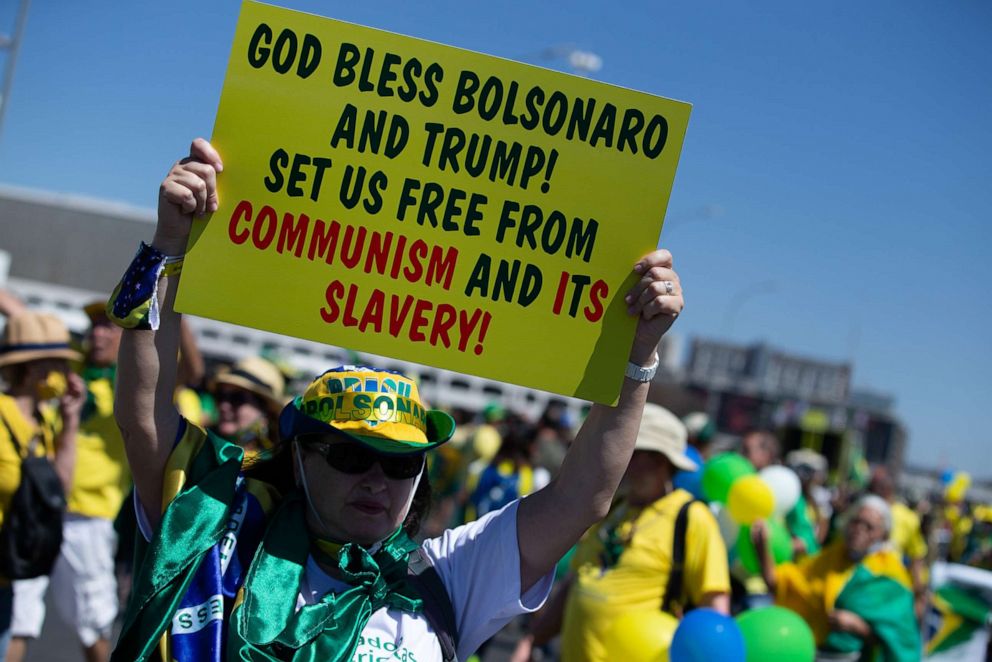
Cuba
Just as travel between the U.S. and Cuba was beginning to increase and relations were thawing between the Cold War adversaries, Trump's 2016 election delivered a shocking blow to any hope of normalized relations.
The Cuban government thinks that if Trump wins reelection, he will increase economic measures against Havana and deepen the island nation's economic crisis. While Trump said last week that he was open to renegotiating with Havana "at the right time," his administration has made next to no effort so far, and Cubans don't expect him to do more any time soon.
If Biden wins, the Cuban government expects he will return to the Obama-era deal that he was a part of -- but it doesn't expect full normalization. The belief is Biden will have to maintain some restrictions, perhaps realizing that voters in Florida will demand some stringent measures for them to stay in the Democrats' fold -- remembering how Hillary Clinton lost there in 2016.
Mara Valdes reported from Havana
South Africa
Africa has not featured in any of the presidential debates or in much of the campaigning, yet the continent has an economic stake in the outcome of the U.S. elections.
As America's largest trade and investment partner in Africa, South Africa has benefited substantially from the African Growth Opportunity Act (Agoa), which allows African countries to export duty-free to the U.S. market, providing both countries meet certain criteria. But, in light of the recent global shifts, U.S. policy towards South Africa might be less generous and accommodating in the future. The $9 billion of estimated trade between the two countries could be imperiled under a second Trump term after his administration identified South Africa as being too restrictive.
Trump's proclivity for Twitter has also raised South Africans' heckles over the past few years. A tweet about land reform -- an already controversial topic in South Africa -- prompted the country's official government Twitter to respond, "South Africa totally rejects this narrow perception which only seeks to divide our nation and reminds us of our colonial past."
I have asked Secretary of State @SecPompeo to closely study the South Africa land and farm seizures and expropriations and the large scale killing of farmers. "South African Government is now seizing land from white farmers." @TuckerCarlson @FoxNews
— Donald J. Trump (@realDonaldTrump) August 23, 2018
The incumbent also referred to African nations as "s---hole countries," and, according to Trump's former lawyer Michael Cohen, once said, "Tell me one country run by a Black person that isn't a s---hole. They are all complete f---ing toilets." Particularly galling to South Africans, Cohen also alleged that Trump said of the country's first democratically elected president, anti-apartheid icon Nelson Mandela: "Mandela f---ed the whole country up. Now it's a s---hole. F--- Mandela. He was no leader."
Cohen's claims, in his 2020 book "Disloyal," prompted the ruling African National Congress party to respond by condemning Trump in a statement as the most divisive, misogynistic and disrespectful person ever to occupy the office of the president: "The icon of our struggle, President Nelson Mandela stands in stark contrast to Trump. A unifying and principled leader, President Mandela reached out to the world and sought to bring peace and a just society. President Mandela also believed in good trade and sound diplomatic relations."
Julius Malema, the controversial leader of the Economic Freedom Fighter political party, has gone further, saying of the 2020 race, "We do not have any expectations on the U.S. elections -- because whoever wins will continue with the same American agenda, which has no respect for other people in the world. ... Whoever wins elections in the U.S. will continue with the militarism, establishment and sustenance of military bases in different parts of the world and imperialism which does not respect other people's lives and freedoms."
Like his rival, Biden has also seldom brought up the continent, but counts on former Obama-era policy experts on his campaign team -- a sign he may seek to restore the previous administration's Africa policy.
Liezl Thom reported from Pretoria, South Africa.
Egypt
For Egypt's President Abdel Fattah El-Sissi, election success for Trump seems to be of utmost importance. He had a frosty relationship with former President Barack Obama, whose administration repeatedly rebuked Egypt for its human rights record and, at one point, suspended U.S. military aid.
In Trump's first year, his administration similarly withheld aid, but backed down. Since then, Egypt has increased its crackdown on Islamist, liberal and secular opposition, jailing thousands and banning any kind of protests -- and Trump's administration has largely stopped short of directly rebuking Cairo, apart from some remarks on Americans jailed in Egyptian cells. "We are not here to lecture," Trump told Arab leaders in the Saudi capital of Riyadh in 2017.
When "Black Lives Matter" protests erupted in the U.S., Egyptian media, which is tightly controlled by the state, leapt to Trump's defense. One famous presenter, notorious for his eccentric views, accused the outlawed Muslim Brotherhood of trying to sow chaos in the U.S. and unseat Trump.
Biden has indicated that he will not follow a similar path, tweeting in July: "No more blank checks for Trump's 'favorite dictator,'" referring to Trump's reported description of el-Sissi. The former vice president was commenting on the release of Mohamed Amashah, a hunger-striking medical student from New Jersey who served more than a year in pre-trial detention for holding up a sign that read "Freedom to All Prisoners" in Cairo's iconic Tahrir Square.
Should he win, Biden is likely to press el-Sissi on a range of human rights issues, with several other American citizens still languishing in Egyptian jails, including several relatives of Mohamed Soltan, a U.S.-based Egyptian activist and a former prisoner himself who spearheads efforts to free political prisoners in Egypt.
Hatem Maher reported from Cairo
Israel and the Palestinian territories
The official Palestinian position on the U.S. election is silent and neutral, but Prime Minister Mohammad Shtayyeh spoke for many Palestinians earlier this month when he said, "God help up if Trump wins re-election."
Palestinian leadership cut all ties with the Trump administration after it moved the U.S. embassy to Jerusalem and the administration has tried to strong arm them into accepting its peace plan with the Israelis -- even cutting aid to Palestinian hospitals.
"Palestinians are watching closely the U.S. election. No U.S. president caused a huge damage to the Palestinian cause as much as President Trump," Professor Ghassan al Khattib of Birzeit University near Ramallah told ABC News. The former Palestinian Authority planning minister added, "He harmed the Palestinians and exaggerated his support for Israel."
That's exactly why Trump's earned so much support in Israel. Prime Minister Benjamin Netanyahu, who is fighting for his political survival and awaiting trial in January 2021, would be nothing short of ecstatic to see Trump reelected. A Trump win would boost his political standing at home, allow for continuity as he pushes for new relations with other Arab countries, and keep Palestinians in their present position -- a very favorable one for the Israeli right wing.
A Biden presidency could mean a harder line against Netanyahu, especially on annexation in the West Bank and his human rights record, and the return of divisions over the Iran nuclear deal.
But it won't necessarily give the Palestinians a boost as Arab neighbors move toward closer ties with the Israeli government. Their diplomatic losses both in the U.S. and among the Middle East's Arab countries will take a long time to fix -- if they can be restored at all.
Bruno Nota and Nasser Atta reported from Jerusalem
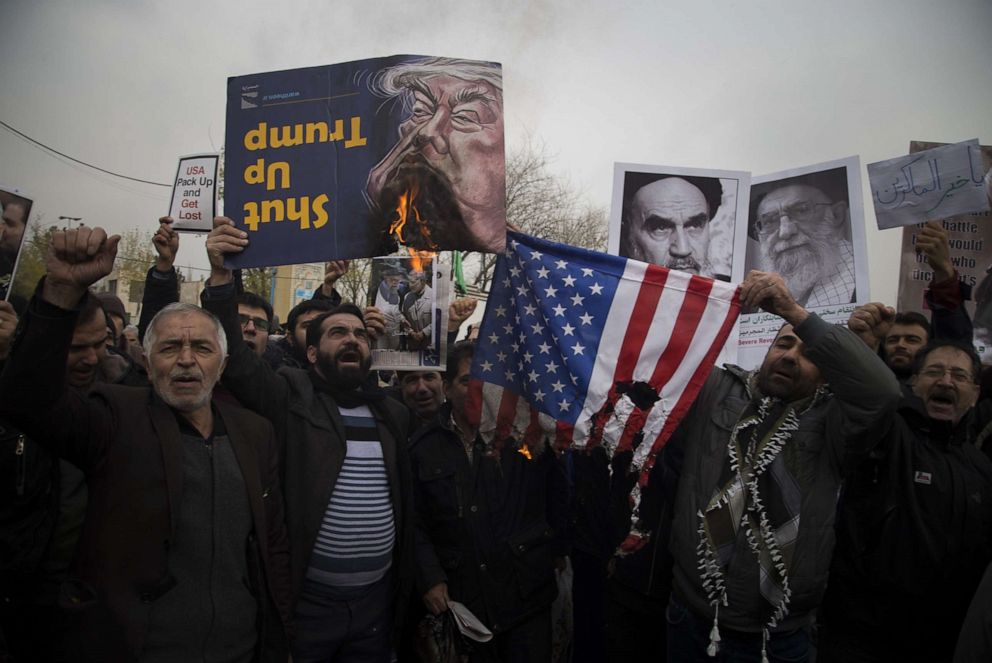
Iran
As with many aspects of life in Iran, how the U.S. presidential election is viewed by government officials is quite different from how it's seen by the general public -- and getting real answers from the latter is difficult at best in these tense political times.
The biggest question for Iran is the future of the Iran nuclear deal, formally known as the Joint Comprehensive Plan of Action, or JCPOA. The current Iranian government, led by President Hassan Rouhani and his Foreign Minister Mohammad Javad Zarif, is willing to revive the deal and assemble the current signatories to negotiate a new agreement if Biden takes office.
But conservatives and senior leaders of the powerful Islamic Revolutionary Guards Corps say that the Islamic Republic will not negotiate with those who killed the military branch's top general, Qassem Soleimani. While Trump sent the order, they do not differentiate between him and Biden, saying that Soleimani was killed by the U.S. and that that guarantees the end of negotiations with the U.S.
For the Iranian people, disappointment is the most dominant sentiment -- they are disappointed and fed up with both sides. It doesn't matter whether it's a conservative or reformist administration in the country's leadership, or a Republican or Democrat in the Oval Office.
Trump says that he will negotiate a "better" deal with Iran in his second term and that it will include Iran's ballistic missile program. But Iran's military power is nonnegotiable no matter what the price and regardless how many sanctions are put on the country -- or who wins Iran's presidential elections in 2021. The Iranian people still vividly remember their vulnerability during the eight-year war with Iraq in the 1980s, how isolated Tehran was, and how the nation needs to stand on its own feet.
Somayeh Malekian reported from Tehran, Iran
Afghanistan
Soon after news that Trump tested positive for COVID-19 reached Afghanistan, it was also reported that the Taliban prayed -- even organized a prayer -- for Trump's urgent recovery. That sent a negative signal to many ordinary Afghans -- not that they needed one after the U.S. signed a historic agreement with the Taliban, giving the insurgent group more political acceptance.

That agreement opened the door for a group that was until very recently considered a terrorist organization to become a major political one. Despite being placed on the United Nations' and individual countries' no-travel lists, Taliban leaders started enjoying freedom and representing the group in meetings with other international partners.
Ordinary Afghan people -- who nowadays have access to social media and are chatting with each other online -- believe that Trump is on good terms with the Taliban. If he wins, many fear he might bring the Taliban back into power to rule the country. With bad memories of brutal Taliban rule still fresh, ordinary Afghans certainly do not want that to happen.
"I don't know about U.S. election. All I want and dream of is a peaceful Afghanistan, but I heard that Trump is a friend of Taliban. I hope he doesn't win," said Hussain Ali, a 45-year-old street vendor, selling fresh fruits from a wheelbarrow on one of Kabul's busy streets. "He might impose the Taliban on us. All I care is about our own country, but since the Americans are involved in Afghanistan, it's better another person come to power because Trump is supporting Taliban."'
Laila Haidary, a women's rights activist who also runs a drug rehabilitation center in Kabul, told ABC News, "Many people believe Taliban have changed, but I do not see any changes in their policies for women. Whoever wins the U.S. election I hope does not turn a blind eye towards the Taliban. Currently, Afghanistan is in a very fragile situation. Any small mistake could change the whole achievement and sacrifices of the past 20 years."
Aleem Agha reported from Kabul, Afghanistan.
Pakistan
Trump once called Pakistani Prime Minister Imran Khan a "very good friend," and many in Pakistan say the two leaders are similar in many ways. They sometimes talk the same way and their pasts stalk them -- and sometimes their past statements.
Pakistanis take great interest in U.S. elections as most here believe the country's fate is tied with U.S. policies for the region.
"I don't want Trump to win," Inam ur Rehman, a laborer, told ABC news. Not knowing Biden's name, he said he wants the other candidate to win because he will be "new to the job and might do something good for us."
Pakistan's relationship with the U.S. has mostly been transactional. For the U.S., Pakistan has been the go-to country in the region, whether it was helping the U.S. defeat the former Soviet Union in Afghanistan or helping the U.S. in their fight against the Taliban and al--Qaida, to -- in the present day -- facilitating the Afghan peace deal with the Taliban.
But of late, the relationship is not as warm as when Pakistan was declared a major non-NATO ally a decade ago. It is widely believed that Trump is in a hurry to leave the region now that the Afghan peace deal is signed, despite its flaws, to help him in his election, and ordinary Pakistanis often blame the U.S. for all the country's ills, even as they expect the U.S. to help the country economically and diplomatically.
A lot of Pakistanis are expected to be watching TV the night of the U.S. elections and discussing the outcome and what it means for the country in the morning.
Habibullah Khan reported from Islamabad, Pakistan.
United Kingdom
It is hard to recall in recent history a more consequential U.S. presidential election for Britain, Europe and much of global foreign policy, from trade to climate action.
A second term for Trump will be a reaffirmation of the populist nation-first approach adopted by Britain's conservative government, by other European countries such as Hungary, and by autocrats in Turkey, Saudi Arabia and the Philippines.
A victory for Biden will leave allies like Prime Minister Boris Johnson looking isolated with no immediate prospect of a trade deal, Brexit negotiations faltering and the special relationship he's built with Trump and Jared Kushner the president's son-in-law and senior adviser, redundant. Conversely, the sigh of relief from Britain's opposition parties and European capitals from Paris to Berlin will be audible.
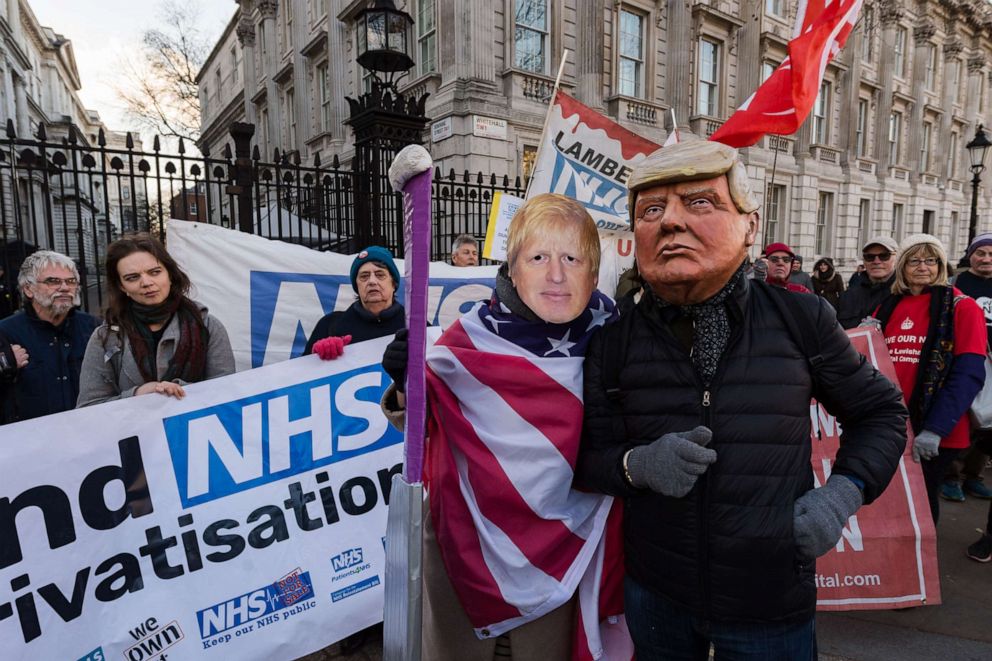
The hope is that a Biden administration will bring American foreign policy back into the fold of Western liberal consensus and that it will retake its position at the top of the table. With shared threats from Russia to China and, most immediately, the pandemic and climate change, there will be much business at hand, so expect a long queue of world leaders beating a path to Biden's Oval Office.
If Trump wins a second term, the silence will be deafening, but it might also strengthen the hand of those who feel, if anything, the last four years have proved that much of the world can carry on without Uncle Sam holding its hand every step of the way.
Ian Pannell reported from London
Russia
Probably no foreign country features so largely and controversially in the 2020 election as Russia. U.S. intelligence agencies have warned that Russia is repeating its interference efforts from 2016, having again concluded that it favors Trump. The FBI has warned that Russia, this time, is running an effort to try to discredit Biden, and according to the U.S. Treasury Department, that includes using a Russian agent in Ukraine's parliament to promote unfounded conspiracy theories that have been picked up by the Trump campaign.
Trump has never dropped his promises to improve relations with Moscow and has shunned criticizing President Vladimir Putin, while Biden shares the consensus among Western governments that Putin is a threat.
Overall, however, Russian officials expect little improvement in relations no matter who wins.
Most observers believe the Kremlin is pleased by Trump's disruptive influence on America's relationship with its NATO allies. But despite Trump's friendliness, in reality the political whirlwind from the Russia-gate scandal and Russia's provocative acts overseas have meant the relationship has gotten worse, with Russia hit repeatedly by congressionally mandated sanctions.
In Moscow, some are alarmed that a Biden presidency will mean an even more hawkish attitude towards Russia. But on a key issue, Biden is more conciliatory -- he has said he would to try to extend the last remaining major nuclear arms control treaty between Russia and the U.S., known as New START. Ahead of its Feb. 5, 2021 expiration, Moscow also wants an extension, but the Trump administration is close to letting the agreement lapse.
Patrick Reevell reported from Dublin
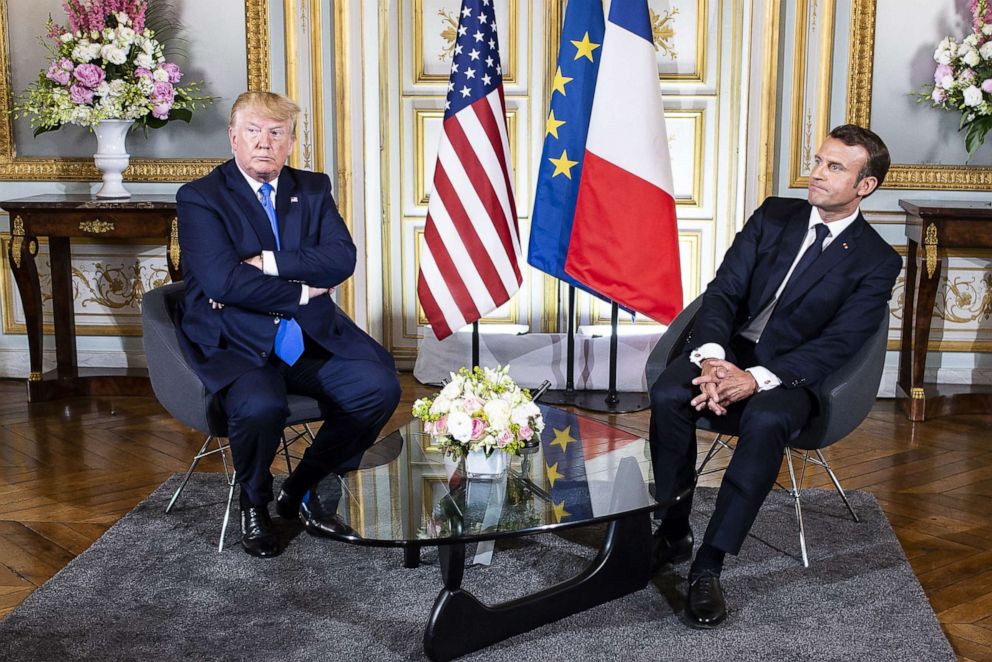
France
In France, a traditionally American-skeptic country, a second win for Trump would be seen by most as the final nail in the superpower's coffin. While Emmanuel Macron has not expressed support for a particular candidate, a Biden win is in the French president's interests. Although few would see it as the victory of "a true leader" across the pond, Biden has general support, including in as high places as the Elysée Palace.
It is hoped that Biden would bring the U.S. back into the Paris climate accord and international organizations such as the World Health Organization -- in essence, returning to a more traditional role on the international scene.
"What is very important in the international context is that the U.S. can play their role as a permanent member of the United Nations Security Council, of a fully engaged member in multilateral issues," Macron said recently. For France in particular, the United States' trade war and the tariffs set by the Trump administration, which heavily affect French goods such as wine, are a point of contention.
Besides, a return to traditional U.S. diplomacy would reassure this European country in more ways than one: American society's widening divisions mirror that of Europe, and the rise of far-right populists in Europe's own backyard. Trump forces the EU to face its own weaknesses.
Macron has been managing the White House resident better than other European leaders -- treating him with all the care due to a foreign power, while profiting off the vacuum left on the international scene to build his own role as diplomatic savior. But a Trump win will also resound as a warning of what cards Macron will be dealt in 2022, with a far-right Marine Le Pen consistently on the rise.
Ibtissem Guenfoud reported from Paris
Germany
The U.S. and Germany have enjoyed an especially close relationship since the end of World War II. But the Trump presidency has put enormous strain on it.
"The transatlantic relationship is practically on life support," Sudha David-Wilp of the German Marshall Fund, American think tank, told The Local in Berlin.
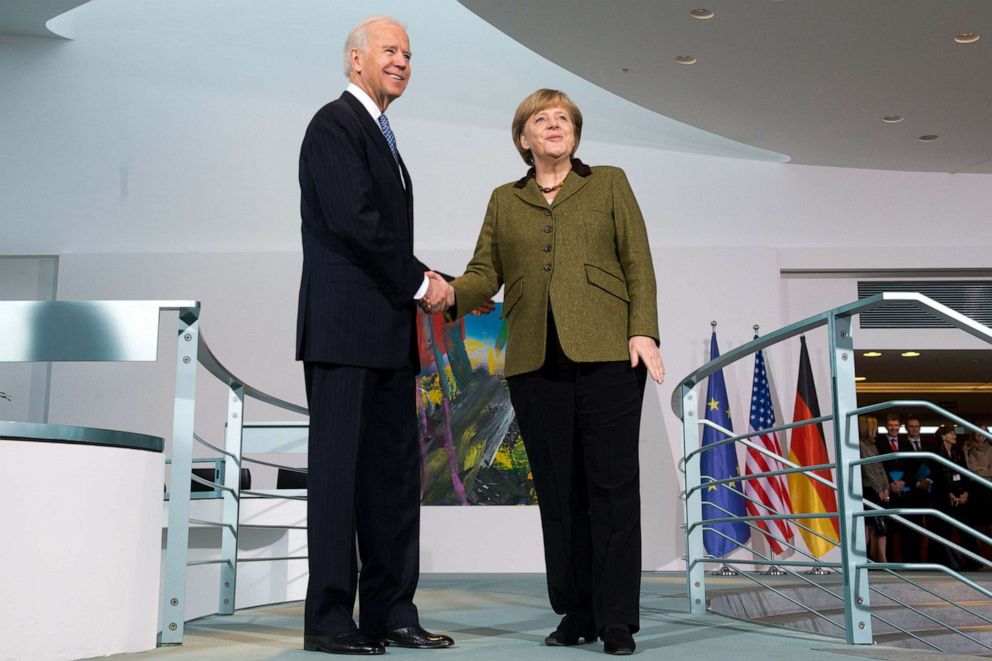
In addition to Trump withdrawing from many multilateral agreements, putting tariffs on EU products, and chiding Germany for not meeting its NATO spending target, Germans are unsettled by the United States' domestic issues. In a recent Pew study, just 26% of Germans had a positive view of the U.S. -- comparable to sentiment after the start of the Iraq War in 2003 and a staggering drop from 78% in 2000.
Angela Merkel, who has been chancellor of Germany since 2005, has said she will not run for re-election again in 2021. There's been no love lost between Trump and Merkel's party, the center-right Christian Democrats. Foreign affairs leader Norbert Röttgen told Politico that cooperation between the U.S. and the European Union at large would be at risk in a second Trump term.
"A country that is internally divided and full of acrimony will at some point lose the ability to shape foreign affairs, so we'd see the American retreat from international politics continue, creating a vacuum that others would be more than happy to fill," he said. Under Biden, the U.S.-German relationship would become a partnership again, he said.
"If Trump wins, the transatlantic rift will make another audible crack. If Joe Biden wins, the loudest sound will be the popping of champagne corks," wrote Andreas Kluth, a German columnist for Bloomberg News.
Grace Dobush reported from Berlin
Italy
Italians in general always watch U.S. elections with a lot of amazement, but this year in particular.
Italian media has marveled at Trump's stance on COVID-19 and his various antics, while many in the public don't really understand what Biden stands for. One shopkeeper said last week that he didn't see any difference between the two white, rich men.
Historically, Italy of course has had a good relation with the U.S., despite the strange bedfellows of the current coalition government and some tensions with the Trump administration over Italy's ties to China and the 5G business and over Trump's tariffs on the European Union.
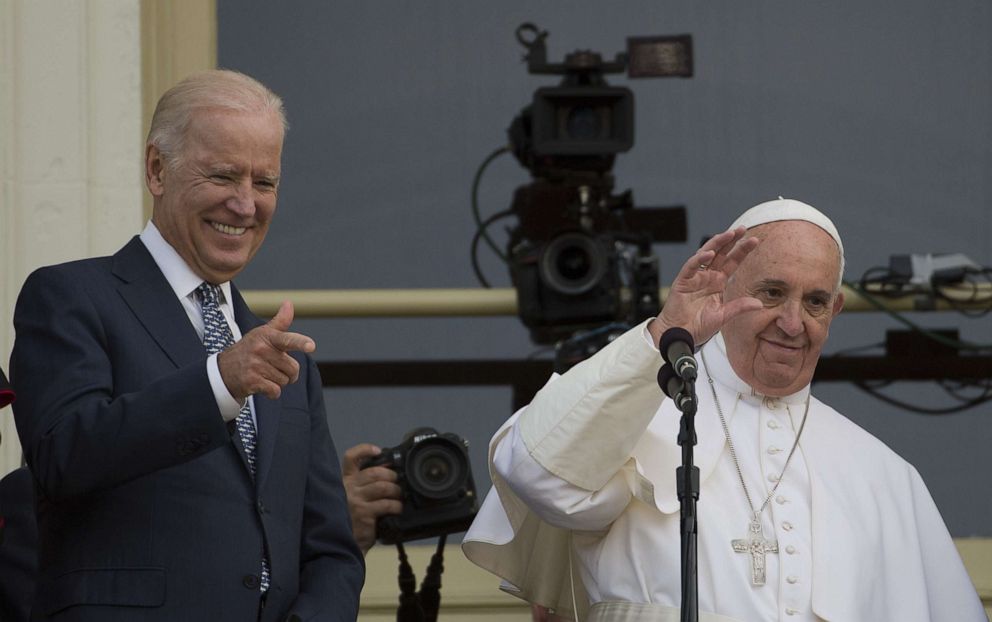
But little is expected to change, with the Italian government cozying up quite fast to any new president and administration -- a key U.S. ally with NATO and American bases on its soil. As Biden has said his priority will be restoring transatlantic ties, "NATO would have more consideration, and the new president would take a tougher stance regarding relations with China and Russia and would be closer to Europe, Japan and Australia," according to Gianni Riotta, a well-known Italian commentator who covers U.S. politics.
Biden would also be only the second Catholic president of the United States, after John F. Kennedy. That may matter less for Italians, although it could make him more simpatico with the Holy See in Rome and Pope Francis, who has served as something of a counter to Trump, particularly with his support for migrants and action on climate change.
Phoebe Natanson reported from Rome
South Korea
Officials in Seoul are holding their breath to see the presidential election results because Biden's victory would bring significant consequences and change to U.S. foreign policy on China, North Korea and U.S. troops in South Korea.
Although President Moon Jae In's administration reiterates the "strong and solid alliance" rhetoric with the U.S. on the surface, it's been steering away and working towards closer relations with China -- South Korea's number one trading partner and a key player in influencing North Korea.
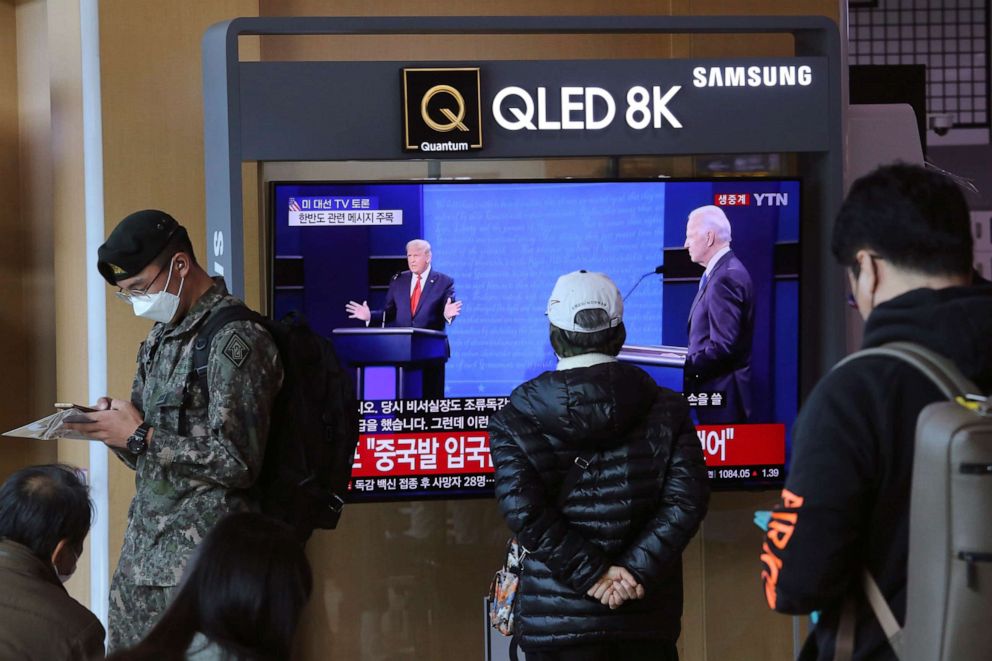
Analysts here expect U.S. pressure on China will continue whether it's Biden or Trump who wins, but whereas Trump fought China on his own and left South Korea alone, Biden's administration would likely take the traditional diplomatic approach and demand South Korea choose sides. That will be a difficult call for Seoul.
As for North Korea, the mood is that Trump's top-down approach dealing directly with Kim Jong Un surely advanced nuclear talks. It is highly likely, analysts here say, that Biden's presidency will force steps back to the pre-Trump era, forcing North Korea back into their hermit kingdom mode.
Biden's heavy focus on "advancing human rights and democracy around the world" and describing Kim as "murderous," "brutal" and "ruthless" would definitely put the current Moon administration effort to maintain a "Moon-Kim romance" at odds with the U.S.
Trump's unilateral demand of South Korea for a massive increase in host nation support for U.S. forces stationed here and the recent decision to relocate troops out of Germany has only reinforced anxiety here about whether the U.S. is a "reliable" partner. Analysts say a Biden administration is likely to dump Trump's strategy and negotiate towards a more amicable direction.
Joohee Cho reported from Seoul, South Korea
Japan
Generally, the Japanese public sees the U.S. as a good partner, but one going through a period of internal trouble. The government has made herculean efforts to preserve the U.S.-Japanese alliance, with former Prime Minister Shinzo Abe largely successful in sidestepping U.S. tariffs or troop withdrawals.
Prime Minister Yoshihide Suga will continue to try to keep the U.S. happy and hold that alliance, regardless of who wins the U.S. election: "Suga would be able to do similarly with either (Trump or Biden), but with a touch preference given to the current administration simply because with Mr. Trump Japan has done quite a lot in the immediate past," according to Tomohiko Taniguchi, former special adviser to Abe's cabinet.
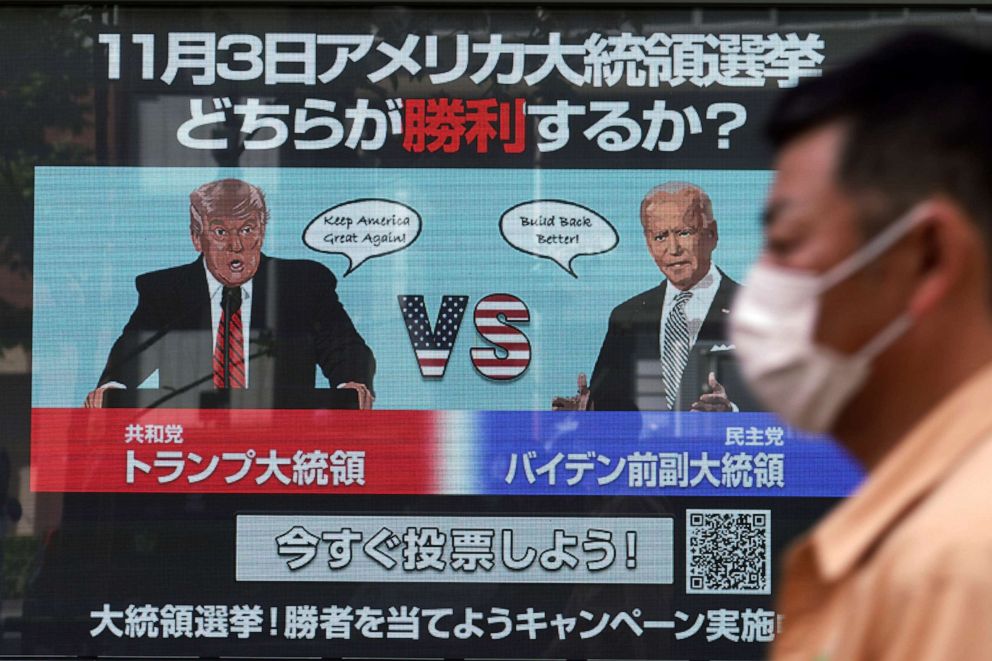
That makes Japan unique among America's allies. Its conservative party, which is almost always in power, prefers Republicans to Democrats in general, according to Koichi Nakano, a dean and political science professor at Tokyo's Sophia University, because they prioritize big business and focus less on human rights, democracy and rule of law.
"That said, what matters is unchangeable," said Tomohiko, "Whoever chances to be in the highest office of the United States, it is the first, second and the third most important task for the Japanese prime minister of the day to build the best possible relationship with that POTUS."
Anthony Trotter reported from Tokyo
China
There may be no more consequential long-term foreign policy challenge for whichever candidate wins the election than the U.S. relationship with China. Since the pandemic, the China hawks within the Trump administration unleashed a multitude of long-gestating grievances against Beijing and confronted them all at once -- on domestic espionage and technology theft; human rights abuses in Xinjiang, Tibet, and Hong Kong; military build-up in the South China Sea; and U.S. arms sales to Taiwan.
The winner will have to assess what that policy has gained for the U.S., as well as to contend with an increasingly confident China. Despite COVID-19 first appearing in China, it appears Beijing has the pandemic completely under control within its borders, and China will likely be the only country to see its economy grow in 2020. With the U.S. unable to get their infections under control and marked by images of social unrest, Chinese state media has played up America's woes as signs that the U.S. is a nation in decline. In that gap, China has flexed its muscles aggressively in the Asia-Pacific region with tensions rising with almost all its neighbors.
Despite this -- or perhaps because of it -- a recent Pew survey showed the only country whose reputation has fared worse this year than China is the U.S.
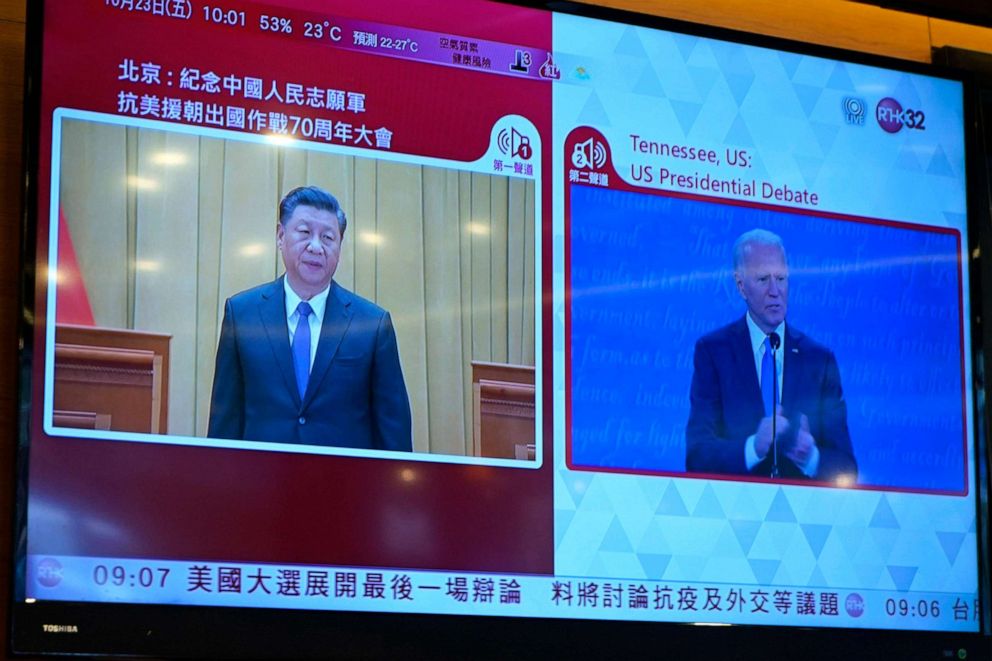
In spite of the trade war and the bellicose rhetoric from the Trump administration, many observers believe that Beijing actually prefers another four years of Trump. The prevailing belief is that the short term pain of dealing with Trump for four more years would yield longer-term gains. A popular nickname for Trump on Chinese social media is 'jianguo' or "Building the Nation."
The nation they're referring to is China., with Trump making China great again by weakening America's network allies around the world, especially in Asia. While China also has increasingly fewer friends in the region, Beijing sees that a Trump administration is viewed internationally as unreliable and chaotic -- creating a major opportunity for them.
While a Biden administration would likely provide return to previous established norms of engagement -- such as not airing the relationship dirty laundry in tweets -- a Biden win would be seen as a greater challenge for Beijing if he and his advisers were able to re-galvanize America's traditional allies into a more unified front to counter China.
The reality is not lost on Beijing that whoever wins the White House, the relationship between Beijing and Washington has already been indelibly altered. The level and pace that it would continue to devolve will depend on which president will sit behind the Resolute Desk on Jan. 20, 2021.
Karson Yiu reported from Hong Kong.




